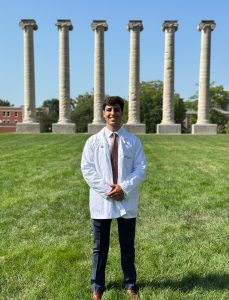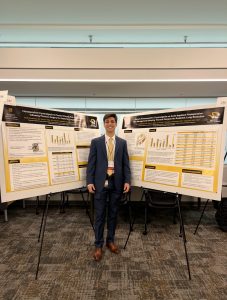
Growing up in Ballwin, Missouri, right outside of St. Louis, David Sniatkewicz, a graduate of CAFNR’s Nutrition and Exercise Physiology (NEP) program, was surrounded by influences that shaped his passion for science and health.
His mom, a nurse who later became a nurse practitioner, and his dad, who may not have worked in health care but still taught him the value of hard work and sacrifice, both shaped how he sees caring for others. Now a medical student at the University of Missouri School of Medicine, Sniatkewicz credits those early lessons for shaping both his compassion and drive to help others.
While Sniatkewicz said he enjoyed math because of the problem-solving it required, it was actually a high school anatomy class that set him on the path toward medicine.
When it came time to choose a college, Mizzou was an easy decision for Sniatkewicz. Attending a school that offered countless opportunities to volunteer, participate in research and pursue a path aligned with his medical goals, all while staying close to home, made Mizzou the perfect fit.
“I was especially attracted to the Honors College because it gave me the chance to push myself and grow alongside like-minded peers,” Sniatkewicz said.
He initially entered Mizzou as a pre-med biology major, but after attending an event showcasing different pre-med programs, he quickly realized that the Nutrition and Exercise Physiology (NEP) program was a better fit.
“I wanted to learn about the human body, not just photosynthesis in plants or the skeletal anatomy of birds,” he said. “NEP gave me opportunities to participate in translational research, drawing blood and looking over brain MRIs instead of pipetting in a lab. I found what I enjoy.”
As an NEP student, Sniatkewicz worked in a lab that investigated how diet influences appetite and body weight. Through this experience, he was able to complete blood work, facilitate fMRI studies and learn about how basic science research is translated to clinical studies that can directly impact patient care. These projects taught him lessons he still uses today, he said.

Among this, NEP is also what influenced his specific career direction. By scribing in a bariatric surgery clinic and shadowing surgeons, he discovered his passion for surgery.
“I enjoy working with my hands and seeing rapid, tangible improvements in patients’ lives,” he said. This combination of research and hands-on clinical experience provided a strong foundation for the next step: medical school.
Even with a clear sense of purpose, the path to medical school hasn’t been easy.
“[It] is a grind,” he said. “It requires a strong work ethic, love for learning and willingness to get out of your comfort zone. I learned how to have fun working hard instead of working hard to have fun. But I couldn’t imagine myself in any other field.”
This mindset has continued to guide him through medical school, where he’s conducting research with the Divisions of Plastic Surgery and Cardiothoracic Surgery. His research works to evaluate a tool called cryoanalgesia, which might reduce chronic nerve pain after thoracic surgery. The research Sniatkewicz has done has already led to conference presentations and a manuscript for publication, but he especially enjoys this topic because it may reduce health care costs and improve outcomes for patients.
Now a medical student in his clinical years, Sniatkewicz would encourage students interested in medicine to follow in his footsteps in CAFNR.
“Consider NEP,” he said. “Continue to put yourself outside of your comfort zone. Keep working hard. I would not be where I’m at today without the opportunities gained and lessons learned from NEP.”
This story was written by a student in AGSC_COM 2150, which gives students the opportunity to explore public relations and journalistic writing with real-world experience in CAFNR.